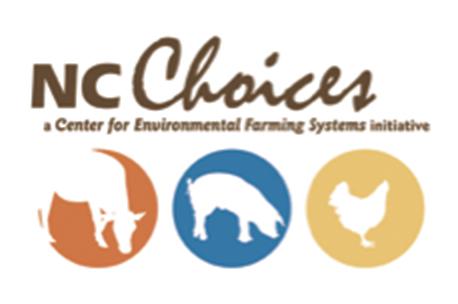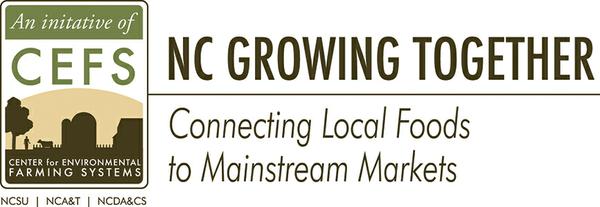Guidelines at a Glance
- Animals are of known age and origin.
- Individual identification is maintained throughout the life of the animal.
- Producer is certified in the North Carolina Beef Quality Assurance Program.
- There are no restrictions on dietary ingredients, housing, or the use of FDA-approved, performance-enhancing technology.
Introduction
These guidelines have been developed to help beef producers who are developing local finishing systems for their cattle. This publication has been developed after careful consideration of consumer feedback about the attributes they desire in locally finished beef. At a minimum most consumers want to know that the animals were born and raised locally, that they have been managed in a system focused on beef product safety, and that the animals were treated humanely. These guidelines are voluntary. Producers are encouraged to evaluate this publication and use it as a starting point as they develop a finishing program. These guidelines are intended for producers using approved technology in a production system that may include confinement feeding with high levels of concentrate feeding (including starchy grains). Some producers may use this document as a starting point and make it more or less restrictive as needed.
This publication is not intended to be critical of other beef finishing systems. The intention is to provide a document that producers can use as-is or with modifications so they can legally and ethically make production claims on their labels and in their marketing materials. As written, this document will allow producers to claim that they are producing and marketing local beef using Beef Quality Assurance (BQA) practices.
Producers who wish to create a more- or less-restrictive protocol (such as “corn-fed”) can modify this document slightly and use it as a guideline to support their production claims. An editable version of these guidelines is available to download.
For more information on how to make sense of label claims and the rules that regulate them, see Special Claims and the Approval Process for Niche Meat Production, LF-003.
Additional NC State Beef Production Guidelines include:
Animal Housing
There are no restrictions on animal housing in this protocol. Animals may be confined in a building or outdoor lot, or they may be raised in pastures. Indoor housing should be well-ventilated and provide enough space for the barn type that is recommended for good animal housing. For more information on space requirements, see Feedlot Design and Environmental Management for Backgrounding and Stocker Operations.
Outside confinement should be in pens that do not become excessively muddy and that provide adequate space. Producers who house animals on pasture should ensure that pasture cover is maintained and follow environmental requirements. All confinement housing is subject to state regulations regarding waste management.
Use of Implants, Growth-Promoting Antibiotics, Parasite Control, Vitamin/Mineral Supplements, and Vaccines
Cattle raised under this protocol will receive only pharmaceutical inputs that are approved by the FDA for use in beef cattle according to BQA guidelines. Producers are encouraged to keep animals healthy by using internal and external parasite control, by following a preventative health program that includes effective vaccination, and by providing adequate vitamin and mineral supplementation. Animals that become sick with common diseases such as foot rot, pinkeye, or pneumonia should be treated with an appropriate antibiotic under the guidance of a veterinarian. Withdrawal times must be strictly followed. These are the basic principles of the Beef Quality Assurance Program.
Animal Origin and Animal Identification
Animals will be home raised from the time they are calves or, if purchased, their farm of origin must be identified. The farm of origin must also adhere to these production guidelines. Records will be kept indicating the date of birth of each animal or, if individual birth dates are not available, a birth date window for a group of animals is acceptable. Animals will be considered “local” by most North Carolina consumers if they are born or raised in North Carolina or in an adjoining state. Note: "Local" is not a supportable "label claim," but putting the address of the farm of origin and using point of sale signs stating the farm’s address is an acceptable approach. Producers who want to participate in the “Goodness Grows in North Carolina” marketing program maintained by the NC Department of Agriculture & Consumer Services Marketing Division can refer to the Got to Be NC Membership Benefits page.
Individual animal identification should be maintained on every animal as soon after birth as possible and throughout the production cycle so they can be tracked back to the farm of origin. If an animal loses its individual identification tag, the tag should be replaced immediately to prevent loss of identity. It is strongly recommended that producers use a secondary form of identification such as a second ear tag or a tattoo to prevent loss of identity. This is especially important if animals eligible for this program are comingled with animals that are not.
Beef Quality Assurance Certification
All farms marketing under these guidelines must have current certification in the North Carolina Beef Quality Assurance Program (NC-BQA) and must adhere to all BQA guidelines, including strict adherence to slaughter withdrawal times on vaccinations and other necessary health treatments. Visit the North Carolina Cattlemen's Association website for more details on the NC-BQA program.
Forage and Feeding Program
To achieve desirable product quality, cattle need to gain weight throughout their lives, so producers should focus on providing high-quality nutrition at all times. Mineral supplements meeting university recommendations should be offered to cows and calves at all times.
Producers should supplement with energy and protein sources appropriately to keep animals gaining at least 1.0 pound per day. To achieve target weight and degree of finish at a reasonable age, cattle should gain from 1.0 to 2.0 pounds per day from weaning to yearling, and from 1.5 to 3 pounds per day during finishing. Producers should work with a nutritionist or other consultant to develop a feeding program that will result in an animal with the carcass characteristics they desire at the harvest age they desire. In general, most producers are advised to harvest cattle at a body condition score of at least 6.5 on a 9-point scale and at an age of no more than 30 months.
Additional information on balancing diets for beef cattle is available at the University of Arkansas Cooperative Extension Service's Beef Cattle Nutrition and Feeding webpage.
Producer Affidavit
Date: _______________
From: ___________________________________
TO WHOM IT MAY CONCERN
This affidavit confirms that I raise my animals in accordance with the attached production protocol (NC State Local Finished Beef Production Guidelines).
Sincerely,
Acknowledgements
The author wishes to express appreciation to Jeffrey Lehmkuhler, Johnny Rogers, Lawton Stewart, Alan Wade, Steve Washburn, Beth Yongue, Debbi Braswell, and Debra Ireland for their useful insights and review of this publication.
This material is based upon work that is supported by the National Institute of Food and Agriculture, US Department of Agriculture, under award number 2013-68004-20363. Any opinions, findings, conclusions, or recommendations expressed in this publication are those of the author(s) and do not necessarily reflect the view of the US Department of Agriculture.
More information:
Center for Environmental Farming Systems
CEFS is a partnership of North Carolina State University (NC State), North Carolina Agricultural & Technical State University (NC A&T), and the North Carolina Department of Agriculture & Consumer Services (NCDA&CS).
Local Foods Publications Series editor:
Joanna Lelekacs, Extension Local Foods Flagship Program Manager
Publication date: June 28, 2016
LF-011-02
The use of brand names in this publication does not imply endorsement by NC State University or N.C. A&T State University of the products or services named nor discrimination against similar products or services not mentioned.
N.C. Cooperative Extension prohibits discrimination and harassment regardless of age, color, disability, family and marital status, gender identity, national origin, political beliefs, race, religion, sex (including pregnancy), sexual orientation and veteran status.




 (1)-01_bZDnRMG.jpg)